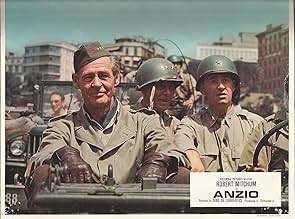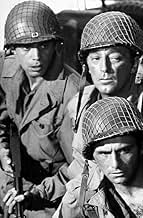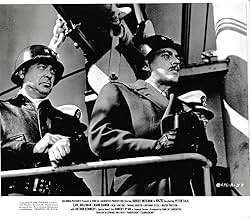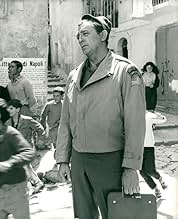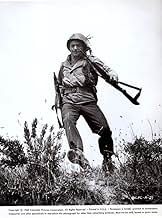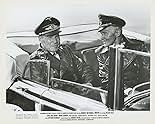Füge eine Handlung in deiner Sprache hinzuA war correspondent witnesses errors made at Allied Command after he and a unit of US Army Rangers land unopposed at Anzio, Italy, but later become trapped behind German lines during one of ... Alles lesenA war correspondent witnesses errors made at Allied Command after he and a unit of US Army Rangers land unopposed at Anzio, Italy, but later become trapped behind German lines during one of the bloodiest battles of WWII.A war correspondent witnesses errors made at Allied Command after he and a unit of US Army Rangers land unopposed at Anzio, Italy, but later become trapped behind German lines during one of the bloodiest battles of WWII.
Empfohlene Bewertungen
Basically, Robert Ryan plays General Mark Clark who was in charge of the operation and was in overall command of the Fifth Army. He was an interesting guy for a general -- tall, vain, brave, half-Jewish, a large-featured face like the mask of Tragedy, carrying around a sidearm as a prop. Arthur Kennedy plays General John P. Lewis (modeled after Gen. Lucas), in charge of the landings themselves. Mitchum accuses him of being "timid" (three times) and in a way he was, although it wasn't entirely his fault. Arthur Franz has a small role as General Lucian K. Truscott, the junior general in command of the Third Division (Audie Murphy's division). All the names have been changed to protect the guilty.
Here, basically, is how it worked. The Allies of half a dozen nationalities were being slaughtered throwing themselves against the German Gustav line, which ran across the Italian boot from sea to sea, commanded by the unconquerable Monte Cassino. The Anzio landings were designed to catch the enemy by surprise from behind and relieve pressure at the Gustav line. Mark Clark (who saw to it that any reference to the Fifth Army in the press appeared as a reference to "Mark Clark's Fifth Army") had supervised similar earlier landings at Salerno. They were successful, but just barely. The landings at Anzio were handed over to Lucas, whose orders included a drive inland, if possible, to the Alban Hills which commanded a perfect view of the beachhead and the main highway to Rome. Lucas had just troops enough to dig in and consolidate or to race pell mell to the Alban Hills, but not enough troops to do both. Lucas was advised by Clark, "Don't stick your neck out like I did at Salerno." (The line is directly quoted in the movie, but is given to Robert Ryan's fictional general.) So Lucas didn't stick his neck out. He went inland seven miles, stopped short of the Alban Hills, and dug in. Clark, who was on the beach, agreed with the decision.
And Lucas wasn't the cocksure but mistaken strategist played by Arthur Kennedy. The real General Lucas kept a diary and it's full of gloomy forebodings. The Germans, under Kesselring and Mackensen, were caught unprepared. Nothing stood between the allies and the Alban Hills, or Rome for that matter. But Lucas did nothing, and for good reasons. He didn't have the resources to take Rome and hold it. Except for the probe by Rangers, as shown on screen, and others by British troops, everyone dug in and waited for the German reinforcements to deploy, which happened apace. Kesselring was a very efficient tactician and had plenty of time to bring in troops in the stalled Allied beach head.
Instead of Anzio rescuing the troops at the Gustav line, the situation was turned around. In the end, some 24,000 American and 9,000 British casualties were evacuated from the beachhead. Clark fired Lucas and gave command to Truscott. When the German resistance finally collapsed, General Clark had an opportunity to drive eastward across the Italian boot and cut off the German troops to the south. He chose instead to forget about capturing the German army and to zip his own troops north along the highway to Rome so that he could "conquer" the open city. You know -- like Julius Caesar? The German army promptly withdrew north to their next massive defense line, where the Allied advance stalled again.
I leave it to the viewer to decide which story is more engaging, the historical one or the plot we see on the screen, which is mostly the story of seven survivors of the Ranger patrol who try to make their way back to Anzio, a story we've seen many times before. I wish I could at least say that the story presented on screen is well done but the fact is that it's not. This is one of Mitchum's lazier performances. Sometimes he sounds positively drunk. No one else stands out, including Peter Falk, who has the reactivity of a noble gas. Arther Kennedy is the smarmy General Whatever-his-name-is. And some other posters are absolutely right about the score. Whew! A simple-minded would-be catchy love song doesn't turn into a martial theme just because you throw some snare drums behind it and play it as a march.
What a missed opportunity.
The real battle for Anzio was a true Allied effort with the British and Americans locking in a duel to the death with the best German troops Hitler could put in Italy. It was supposed to break the deadlock of the Gustav line by flanking but was doomed from the start because it lacked sufficient landing strength. True, the road to the Rome WAS uncontested on D-Day, but Kesselring himself said later he would have easily cut off and destroyed any such small force if it extended itself even to the Alban Hills, let alone Rome.
The story of the loss of Darby's Rangers is covered in other movies better; of the 767 Rangers sent on a mission, only six returned. It is but one of many stories of horrific sacrifice of young lives. Further south, in a diversionary mission designed to take pressure off the Anzio landing, the US 36th division lost 1600 men in a single night trying to cross the Rapido river. The British took terrible losses, especially in the German offensive of 18-19 Feb 1944, mainly due to their bad luck of being placed in the line in the area in which Hitler personally chose to concentrate the main German offensive, which came within about 1000 yards of breaking the last line of defense.
Such losses are unimaginable today, yet they were accepted then as the price that must be paid to rid Europe of Hitler.
There are no films that I know of that do justice to Anzio. One would be better served by reading any of the numerous books about Anzio or even reading the write-up at http://www.army.mil/cmh/brochures/anzio/72-19.htm -- it is infinitely more interesting than this movie.
The film stars Robert Mitchum ("The Enemy Below") as Dick Ennis, a cold and cynical war correspondent that does his work on the front lines with the infantrymen. When the squad he is accompanying gets cut off behind the German lines due to an ambush, he must pick up a gun and help them fight their way back to Allied lines.
The movie has a lot going for it, right from the start. Every actor looks comfortable, especially Mitchum. Robert Mitchum has never been one of my favorite American actors, simply because he always seems to be acting despite the dimensionality of the part, Mitchum can never seem to break out of a box. Here, he looks to be having plenty of fun and seems quite natural in the role. Mark Damon ("Between Heaven and Hell") provides the necessary dramatic opposite as an infantryman who can't seem to agree with Ennis on his policies. Arthur Kennedy ("Attack and Retreat") is the exact opposite of Ennis' character as the incompetent General Lesley, who takes too much time establishing a solid beachhead and allows the Germans to launch an offensive, pinning his men down on the beach. Peter Falk ("Situation Normal, All Fouled Up"), on the other hand, is totally wasted as Corporal Rabinoff, a soldier who has become addicted to combat. Earl Holliman ("Armored Command") is the Sergeant in command of the squad, and he makes the most out of a clichéd-role by giving his character personality. Be sure to watch for Robert Ryan, Anthony Steel, Arthur Franz and Patrick Magee as Allied Generals.
There is only one big battle sequence, which expertly staged and filled with tanks, extras and big explosions. However, its effectiveness is limited because of two key flaws. Primarily, American soldiers are seen to stand up in the open and rush German machine-gun nests, only to be mowed down by overwhelming enemy fire. Secondly, there's a ridiculous scene in which Ennis and a soldier engage in a discussion about the war right in the middle of a fight, despite the fact that bullets and artillery shells are landing all around them! The final, small-scale, climactic showdown with German snipers was much more suspenseful, due to some excellent editing and great music score.
One major flaw in the film is, unfortunately, the script. It's as if "Anzio" can't decide if it wants to be a gung-ho flag-waver, or a downbeat, anti-war story. The first half the film is filled with humorous, almost slapstick scenes, although some of Mitchum's dialog hints that this is going to change and it does, in fact the focus turns around 180 degrees. Throughout the second half of the film, the action stops dead in its tracks so that the characters discuss issues of personal sacrifice, what constitutes above and beyond the call of duty, etc until it's been repeated so much that you can't stand to hear anymore. For all of this discussion, the conclusion is pretty forced. Mitchum says something along the lines of, "Men kill each other because they like to. Maybe if we all sit back and realize it, we could stop the killing and get along." That statement defines over-emphasis. Instead of being a history lesson about the real Anzio campaign, the film turns into a social commentary on Vietnam.
The on-location shooting served the proceedings well, as the film looks like sunny Italy in every frame. The scene in the Italian house looked excellent, and Dmytryk uses wide angles throughout to show off the scope of the Italian locales. The score ranges from victorious and rousing to mournful and depressing, which contributes a great deal to the mood of some important scenes such as the entry into liberated Rome and the significance of one character's death in the sniper sequence.
"Anzio" is a mixed bag, but despite a lack of focus on one theme, it manages to be entertaining and satisfying as a drama, with enough well-staged action scenes to hold it together and help obscure the muddled anti-war sentiments.
Wusstest du schon
- WissenswertesPeter Falk in his 2006 autobiography "Just One More Thing: Stories of My Life" stated that he didn't like the script for this film, finding it hackneyed and full of cliché; he wanted to leave the film for these reasons. However, producer Dino De Laurentiis encouraged him to stay by giving him film-poster name-above-the-title credit as well as choice of writer for his dialogue. Falk stayed on the picture and apparently actually wrote his own dialogue.
- PatzerToward the beginning of the film, Cpl. Jack Rabinoff (Peter Falk) is in the back of a Red Cross ambulance with three prostitutes and grabs a shoebox-sized box labeled "Hershey's Milk Chocolate Multi Pack" with a "1968 design" of the Hershey logo. One of the prostitutes reaches into the box and pulls out a "1968 design" box of Brach's Milk Chocolate Stars. In addition to the two anachronisms, Hershey's and Brach's are two separate companies.
- Zitate
Dick Ennis: [attending to Rabinoff who went into sudden convulsions] Look, fellows, I think he can use the air more then the company, okay? Anything anybody can do?
Cpl. Jack Rabinoff: No, unless you have a band-aid.
Dick Ennis: Very funny.
Cpl. Jack Rabinoff: Oh, it's murder. The stomach, you see? A Japanese grenade ripped my insides. Got medal in there. Under tension it contracts and all hell breaks loose. I must have been tense.
Dick Ennis: Good thinking. You belong in a hospital, not in a war.
Cpl. Jack Rabinoff: Yeah, that's what they said when they sent me home.
Dick Ennis: You mean you got out, then you went to Canada and joined this outfit?
Cpl. Jack Rabinoff: That's right.
Dick Ennis: How did you get past the doctors?
Cpl. Jack Rabinoff: Lied about my age.
Dick Ennis: You gotta be crazy. Half your guts blown out and you're back here. What for?
Cpl. Jack Rabinoff: Awkward time for a interview.
Dick Ennis: You got something better to do? Why did you re-enlist?
Cpl. Jack Rabinoff: Why? Because I like it, you know. I missed it, Ennis. With all the mud and pain, these clowns giving orders, there's nothing like it. Look, a guy sells shoes for 40 years. I live more in one day, I see more and feel more. I taste more, I think more. I'm more, understand? I'm more. There's more to living than breathing. Capisce?
Dick Ennis: Capisce.
Cpl. Jack Rabinoff: You're the same way, that's right. War is part of you. You belong to it and when this one's over, you'll find another and I hope I'm with you.
- VerbindungenReferenced in The Carol Burnett Show: Nanette Fabray and Steve Lawrence (1970)
Top-Auswahl
- How long is Anzio?Powered by Alexa
Details
- Erscheinungsdatum
- Herkunftsländer
- Sprachen
- Auch bekannt als
- Anzio
- Drehorte
- Royal Palace, Caserta, Campania, Italien(opening scene)
- Produktionsfirmen
- Weitere beteiligte Unternehmen bei IMDbPro anzeigen
- Laufzeit1 Stunde 57 Minuten
- Seitenverhältnis
- 2.35 : 1
Zu dieser Seite beitragen




